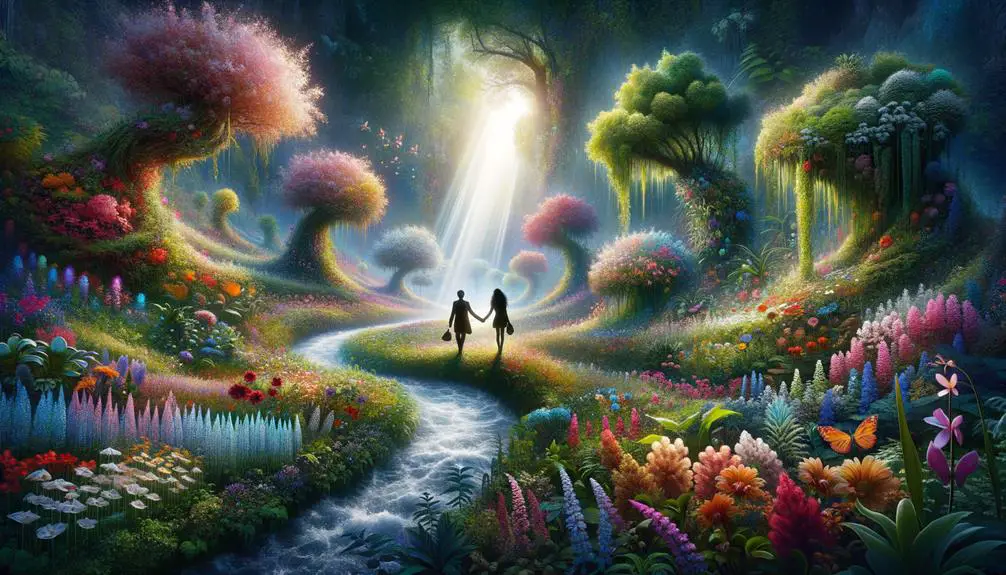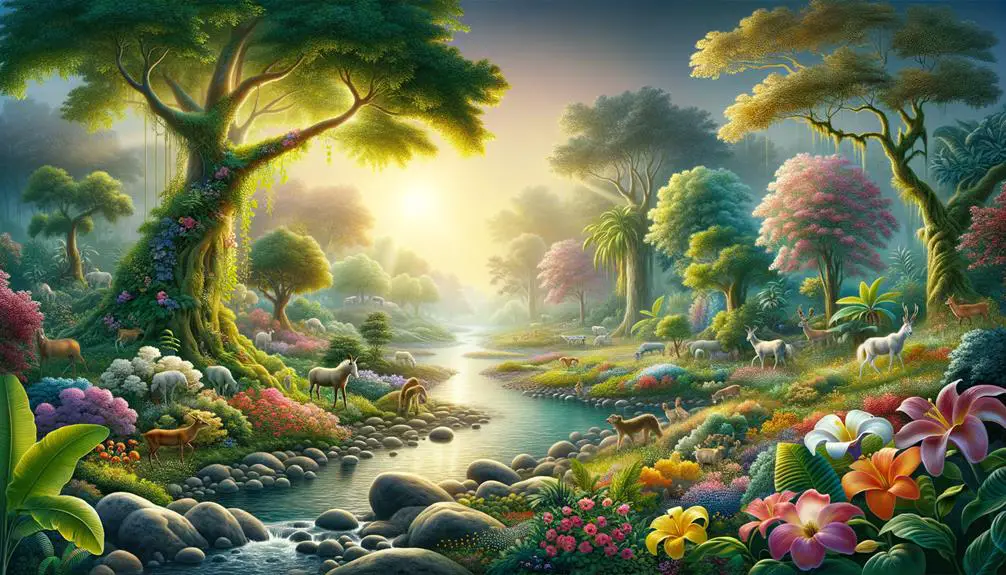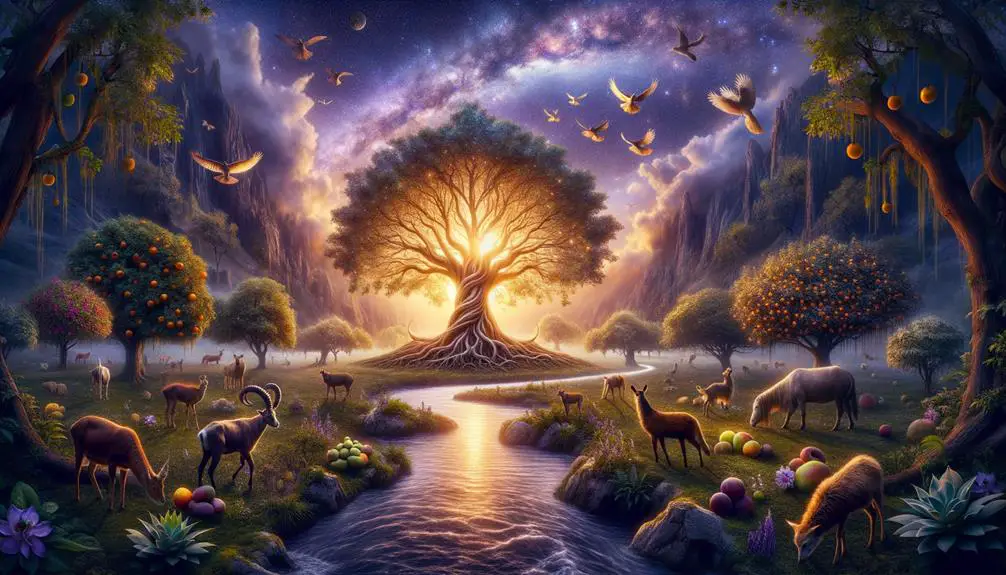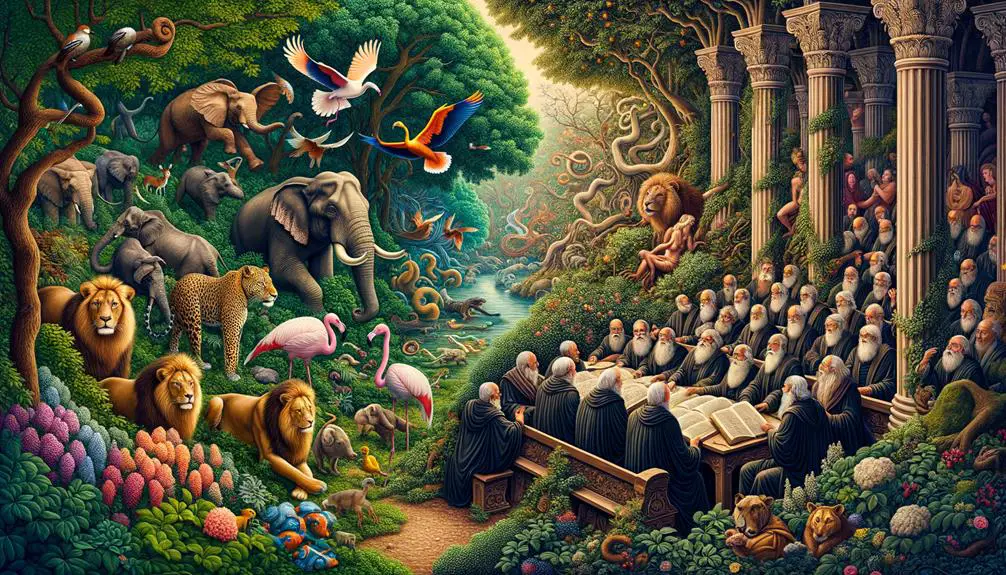Discover Eden in the Bible, a place of mystery and paradise lost, beckoning explorers into its ancient and symbolic depths.

Who Is Eden in the Bible
In the Bible, Eden is both a paradise lost and a symbol of innocence, a place you might struggle to locate on any modern map yet find deeply embedded in the fabric of ancient narratives.
You're about to embark on a journey through time, tracing the contours of Eden's geographical mysteries and unearthing the rich symbolism and theology that have shaped humanity's understanding of its origins.
As you explore the legacy and interpretations of Eden, you'll discover why this seemingly simple garden story continues to captivate the imagination and spark debate among scholars and seekers alike.
Let's uncover what lies beneath the surface of this ancient tale.
Key Takeaways
- Eden is not a person, but a divine paradise created for Adam and Eve.
- Symbolizes divine provision and the ideal existence before humanity's fall.
- Location is unknown, with theories ranging from Mesopotamia to the Nile.
- Its legacy influences theological interpretations of divine-human relations.
The Genesis of Eden

In the biblical narrative, the Garden of Eden first appears in Genesis as the divinely created paradise intended for humanity's first inhabitants, Adam and Eve. This setting, central to the creation narrative, serves not merely as a backdrop but as a vital component of the story's theological and moral framework. Embedded within the description of Eden is a profound exploration of the relationship between the divine, humanity, and the natural world.
The narrative meticulously details the garden's diversity, portraying it as a place of unparalleled beauty and abundance. Every tree that's 'pleasant to the sight, and good for food' (Genesis 2:9), including the iconic Tree of Life and the Tree of the Knowledge of Good and Evil, finds its home in Eden. This diversity isn't just an embellishment but a reflection of the garden's role as a symbol of divine provision and the intended harmony between creation and humanity.
Moreover, the rivers flowing out of Eden to water the garden underscore the theme of life-giving sustenance, further highlighting the garden's function as a source of all that's necessary for life. This aspect of the narrative emphasizes the garden's role as a sacred space where the natural order, as ordained by the divine, is maintained.
Through its detailed portrayal of Eden's diversity, the creation narrative invites you to ponder the intricacy and interconnectedness of life. It suggests that Eden was more than just a dwelling place for humanity's progenitors; it was a manifestation of divine benevolence and a model for the harmonious coexistence of all creation.
Eden's Geographical Mysteries
Despite its pivotal role in biblical narratives, the exact geographical location of the Garden of Eden remains shrouded in mystery. You've likely encountered various theories, each presenting compelling evidence yet none conclusive. Scholars and theologians alike delve into ancient texts and geographical clues, aiming to piece together Eden's whereabouts. The quest intertwines Eden's climate and archaeological pursuits, sparking endless debates and fascination.
Theory |
Location |
Emotion Evoked |
|---|---|---|
Mesopotamian |
Between Tigris and Euphrates |
Wonder |
Armenian |
Highlands near Mount Ararat |
Intrigue |
Southern Mesopotamia |
Persian Gulf region |
Curiosity |
African |
Headwaters of the Nile |
Amazement |
Symbolic |
Non-geographical |
Enlightenment |
Theories range from literal locations, such as the confluence of Tigris and Euphrates, suggesting a lush, vibrant climate akin to Eden's described fertility, to more symbolic interpretations that render the search moot. Archaeological pursuits have unearthed ancient civilizations and artifacts in these regions, adding layers to the debate but offering no definitive proof of Eden's precise location.
Your engagement with Eden's geographical mysteries isn't just about pinpointing a spot on a map; it's a journey through time, exploring humanity's longing to connect with its origins. Each theory reveals not only the diverse climates that could have supported such a paradisiacal garden but also the rich tapestry of human belief and its impact on archaeological exploration. As you ponder these mysteries, you're participating in a millennia-old quest, one that has captivated minds and hearts in the search for our beginnings.
Symbolism and Theology

Moving beyond the geographical enigmas, let's explore how Eden's symbolism and theology offer deeper insights into its biblical significance. Within the narrative, Eden isn't merely a physical location; it embodies a theological manifesto, revealing Divine architecture and the intended harmony between creation and creator. Eden's flora, often depicted as lush and diverse, signifies more than life's sustenance; it represents the provision and abundance that emanates from Divine benevolence.
Analyzing Eden through a theological lens, you'll find it serves as a prototype of the ideal existence before the fall of humanity. Its design reflects a Divine architecture, meticulously crafted to foster communion between God and humans, amidst a setting that sustains life effortlessly. This divine blueprint isn't just about physical structures but encompasses a complex interplay of moral, spiritual, and physical harmonies.
The inclusion of various trees, especially the Tree of Life and the Tree of the Knowledge of Good and Evil, introduces a layer of moral choice within this divine architecture. These elements aren't arbitrary; they're integral to understanding humanity's relationship with divine commands and the consequences of disobedience. Eden, thus, becomes a stage where free will, divine provision, and moral testing intertwine.
In essence, Eden symbolizes a lost ideal, a reminder of what was and what could have been. Its theological significance extends beyond historical curiosity, inviting reflection on divine-human relationships, stewardship of creation, and the pursuit of reconciliation and redemption. Through Eden's story, you're invited to ponder the intricate balance of divine architecture, moral choice, and the quest for a restored Edenic existence.
Eden and Humanity's Origin
Eden's narrative offers a pivotal foundation for understanding humanity's origin, positioning it not just as a place but as a profound statement on creation and divine intent. Through its depiction, you gain insight into early agricultural practices, which aren't merely historical footnotes but are integral to comprehending the human transition from nomadic lifestyles to settled communities. The biblical Eden serves as the first setting where humanity engages in farming, marking a significant milestone in human development. This emphasis on agriculture within Eden's context suggests a divine endorsement of cultivation and stewardship of the land as fundamental human activities.
Moreover, the genealogical records tied to Eden aren't just lists of names. They serve as vital links connecting humanity to its initial point of divine interaction. These records do more than trace lineage; they underscore the continuity of human-divine relationships through generations, starting from Eden. This continuity suggests an unbroken line of heritage and responsibility passed down from the first humans, positioning Eden as not only the cradle of humanity but also the foundation of its ongoing narrative with the divine.
Analyzing Eden through these lenses—its role in the initiation of agricultural practices and the significance of its genealogical records—provides a detailed, objective understanding of humanity's origin. It illuminates Eden's place in the broader biblical narrative as more than a mere garden; it's a symbol of humanity's genesis, its fall, and the enduring connection between creation and Creator. Through this analysis, you're invited to see Eden not just as a lost paradise, but as a key to understanding humanity's place in the world and its relationship with the divine.
After Eden: Legacy and Interpretations

The legacy of Eden, beyond its immediate narrative, has profoundly influenced theological interpretations and human understanding of divine-human relations throughout history. This impact is visible not only in religious texts but also in cultural expressions and philosophical discourses.
- Eden's descendants have been a focal point for theological debates, especially regarding the concept of original sin and its implications for humanity.
- Cultural influences of Eden can be seen in literature, art, and music, where the garden's imagery often symbolizes innocence and paradise lost.
- Interpretations of Eden have shaped ideologies about gender roles and relationships, reflecting and sometimes challenging traditional views.
- The story of Eden continues to inspire ecological and environmental discussions, highlighting the human responsibility towards nature and stewardship.
Eden's narrative has been dissected and reinterpreted across generations, with each era projecting its anxieties, hopes, and moral dilemmas onto this seminal story. Its rich symbolism and open-ended questions about obedience, free will, and the nature of evil invite endless exploration. Eden serves as a mirror, reflecting humanity's perennial quest for understanding its place in the universe and its relationship with the divine.
Through the lens of Eden, theologians, artists, and philosophers have wrestled with the complexities of human existence. Eden's legacy, therefore, isn't just about its historical or mythological origins but how it continues to resonate with Eden's descendants, shaping their cultural narratives and spiritual inquiries. This ongoing dialogue ensures that the story of Eden remains a vibrant part of human consciousness, influencing our collective imagination and ethical frameworks.
Frequently Asked Questions
How Has the Concept of Eden Been Depicted in Various Artistic Expressions Throughout History?
Throughout history, you've seen the concept of Eden portrayed in numerous artistic expressions, each reflecting the era's cultural and spiritual values. Garden motifs, a central theme, have been intricately woven into Renaissance paintings, symbolizing purity and paradise.
Artists during the Renaissance period masterfully integrated these motifs, showcasing Eden not just as a biblical location but as a universal symbol of utopia. Their work invites you to explore Eden's enduring influence on art and society.
Are There Any Major Religions or Cultures Outside of Judeo-Christian Beliefs That Have a Similar Concept to Eden?
Imagine wandering through a lush, mythical garden. You're seeking Eden's counterpart across different cultures. Indeed, many major religions and cultures harbor mythological parallels to Eden, each with its own cultural symbolism.
These tales, rich in detail, often feature paradisiacal realms where harmony reigns. Analyzing these narratives, you'll uncover a universal longing for a pristine beginning, reflecting humanity's collective dream of a perfect world untouched by the complexities of modern life.
How Have Interpretations of Eden Influenced Modern Environmental Movements and the Concept of Conservation?
Interpretations of Eden have deeply influenced modern environmental movements and the push for conservation.
You'll find that eco-theology insights draw heavily on this idealized nature concept, urging a return to sustainable paradigms.
These perspectives argue for living in harmony with the environment, inspired by a vision of pristine natural balance.
This has led to a reevaluation of how we interact with our planet, promoting practices that aim to preserve and restore Earth's ecosystems.
In What Ways Has the Story of Eden Been Used in Political or Social Discourse Throughout History?
Imagine a world where every policy blooms like flowers in Eden; that's how Eden's story has woven itself into political and social discourse.
Leaders have often used 'Eden economics' to promote sustainability and environmental conservation, portraying their policies as gateways to a modern paradise.
The narrative of Eden has also been pivotal in shaping 'Paradise policies,' influencing debates on morality, governance, and societal norms, offering a foundational metaphor for ideal societal structures.
Can the Concept of Eden Be Found in Any Unexpected Genres of Literature or Unexpected Cultural References Outside of Religious Texts?
Absolutely, you'll find Eden's concept in surprising places, far beyond religious texts. In music, lyrics often evoke Eden to symbolize lost innocence or utopian dreams, adding layers of meaning to songs across genres.
Meanwhile, Eden-inspired fashion uses motifs and themes from this paradise to create collections that blend nostalgia with a longing for an unspoiled world. Both realms show how deeply this idea has infiltrated cultural expressions, reshaping them in innovative ways.
Conclusion
In essence, Eden transcends mere geography, embodying humanity's perpetual quest for perfection and harmony. It symbolizes an untouched paradise, a mirror reflecting our deepest yearnings for innocence and unity with nature.
Analytically, Eden serves as a poignant reminder of the fragile bond between humanity and the divine, urging us to ponder our origins and the paths we've tread since. Its legacy, rich in interpretations, continues to inspire and challenge, weaving through our collective consciousness like a timeless tapestry of hope and caution.



Sign up